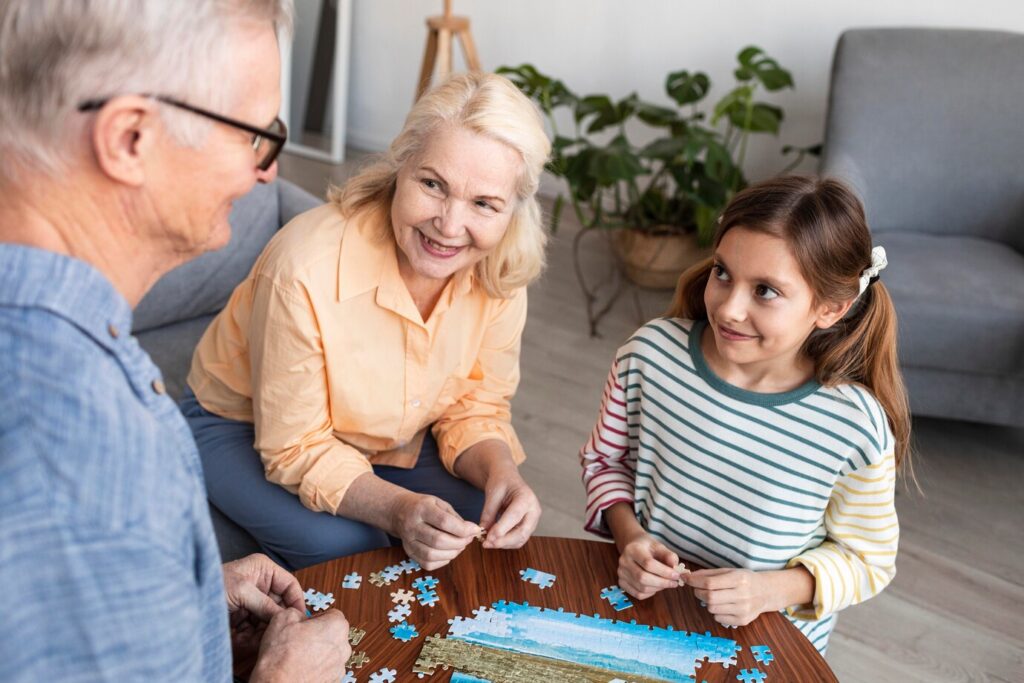60-Character H1 Title: Best Memory Exercises to Sharpen Your Mind
Consistent memory exercises are one of the most effective ways to sharpen your mind and preserve cognitive function as you age. Whether you want to improve focus, retain information, or support long-term brain health, these activities are key to maintaining mental sharpness. At Valley Spring Memory Care, we believe in the power of stimulating the brain through intentional practice.
From memory exercises for adults to memory exercises for seniors, incorporating these into your routine can significantly impact your day-to-day cognitive performance. Let’s explore some highly effective techniques and games that can enhance your mental acuity.
Foundational Memory Exercises
While it might seem intimidating, foundational memory exercises can considerably enhance your cognitive abilities. These memory enhancement techniques challenge your brain, promoting neural connections and fostering cognitive growth. By incorporating simple activities into your routine, you’ll experience significant benefits, such as improved memory and enhanced problem-solving skills. For instance, try recalling lists or engaging in memory exercises or games requiring you to retrieve information actively.
Research shows that regular practice sharpens your focus and boosts your ability to learn and retain new information. By committing to these exercises, you’re enriching your own cognitive landscape. Additionally, integrating strategic games for problem-solving into your routine can further enhance your mental sharpness.
Language Learning for Cognitive Enhancement
Learning a new language offers significant cognitive benefits, enhancing memory and problem-solving skills. Language apps effectively support this process, making it accessible and engaging. Employing specific memory retention techniques can further solidify your understanding and recall of new vocabulary and concepts. Additionally, regular cognitive engagement through language learning activities can improve short-term memory exercises and overall mental agility.
Cognitive Benefits of Bilingualism
Engaging with multiple languages boosts cognitive flexibility, allowing you to switch between tasks and ideas more efficiently. These benefits extend to memory exercises for seniors and adults alike, as learning a new language supports both short-term memory exercises and long-term recall. Furthermore, engaging in brain-stimulating activities complements these efforts.
Language Apps Effectiveness
These mobile language tools offer several features that can significantly enhance your mental function:
- Gamified learning experiences keep you engaged
- Cultural immersion techniques deepen understanding
- Vocabulary-building apps enhance memory
Such strategies resemble the five brain exercises that build memory, logic, and focus. Additionally, these apps support maintaining cognitive function.
Memory Retention Techniques
Utilize mnemonic devices, spaced repetition, and mindful vocabulary practice. These techniques work especially well for memory exercises for adults looking to retain more information. Incorporating engaging activities reinforces neural pathways that help sustain cognitive strength.

Reading and Note-Taking for Information Retention
Active reading techniques and strategic note-taking are critical in long-term information retention. These practices stimulate short-term memory exercises by training the brain to focus, recall, and process new information more efficiently.
Active Reading Techniques
Use questions, summaries, and highlighting as part of your active reading routine. These techniques strengthen your ability to retain information and are excellent memory exercises for seniors or anyone hoping to maintain cognitive flexibility.
Note-Taking Strategies
Utilize handwritten notes, the Cornell method, or mind mapping to deepen comprehension and memory. These strategies help you stay organized and focused while supporting your brain’s ability to recall important facts.
Mindfulness and Stress Reduction
Mindfulness helps your brain operate at peak performance by reducing anxiety and boosting attention span. These are essential components of effective five brain exercises that support memory and focus.
Benefits of Mindfulness
- Reduces stress that interferes with memory
- Improves concentration and task performance
- Boosts memory retention and mental clarity
Incorporating deep breathing and meditation can improve both your emotional well-being and cognitive abilities.
Strategic Games for Problem-Solving
Strategic thinking games provide dynamic platforms for engaging in memory exercises that build logic, focus, and planning skills. These games foster long-term cognitive health through fun and interactive methods.
Chess, Sudoku, and matching games challenge your brain and act as valuable memory exercises for adults who want to keep their minds sharp.
Recommended External Links:
Memory Challenges for Attention and Concentration
Incorporating short-term memory exercises like repeating number sequences or recalling picture patterns boosts both attention and memory. These five brain exercises help improve concentration:
- Visual memory challenges
- Auditory memory recall
- Dual-task activities for mental agility
These techniques can be especially beneficial for older adults looking to stay mentally agile.

Puzzle Games for Verbal Fluency and Pattern Recognition
Games like crosswords, word searches, and logic puzzles are excellent memory exercises. They sharpen verbal recall and improve pattern recognition—two important cognitive skills. Studies show that engaging in puzzle games regularly boosts short-term memory and overall brain performance.
Strategic Thinking Games for Cognitive Development
Strategic thinking games like Risk, Mahjong, and card games challenge you to think several steps ahead, strengthening decision-making and logic. These activities are ideal memory exercises for seniors looking to keep their brains engaged.
Comprehensive Cognitive Training
Well-rounded cognitive training should include a variety of activities, including:
- Language learning
- Puzzle-solving
- Note-taking
- Strategic gaming
By regularly practicing these memory exercises, you can build resilience, improve focus, and sharpen mental function. Incorporating different types of stimulation ensures a well-balanced cognitive routine tailored to your specific goals.
A Sharper Mind Starts with Practice
Committing to a consistent routine of memory exercises is one of the best ways to protect and enhance your cognitive well-being. Whether you’re enjoying memory exercises for seniors, playing memory exercises games, or exploring five brain exercises to add variety to your day, each method strengthens your mind and supports long-term mental agility.
At Valley Spring Memory Care, we support your journey to cognitive wellness. For more personalized support or to explore our programs, give us a call at 209-710-4783 or schedule a tour today!

Frequently Asked Questions
What is the best exercise to improve memory?
Aerobic exercises like walking, swimming, or cycling are considered some of the best for improving memory. These activities increase blood flow to the brain, supporting new neuron growth and enhancing cognitive function. Studies show that regular aerobic exercise can improve memory, especially in older adults. Aim for at least 150 minutes of moderate-intensity activity each week.
How do I strengthen my memory?
Combine regular physical activity with mental exercises like puzzles, learning new skills, or playing memory games to strengthen your memory. Maintaining a healthy diet rich in omega-3s, staying socially engaged, and getting enough sleep also support brain health. It’s important to reduce stress, as chronic stress can impair memory over time. Consistency across these areas creates the best results.
What exercises get rid of brain fog?
Light cardio workouts, yoga, and mindfulness meditation effectively reduce brain fog. These activities improve blood circulation and lower stress, both of which help clear mental fatigue. Breathing exercises and short walks during the day can also enhance alertness and mental clarity. Staying hydrated and getting quality sleep are essential additions to these practices.
What is the best thing for memory loss?
The best approach to memory loss includes regular exercise, cognitive stimulation, and a brain-healthy diet. Staying mentally active—through reading, puzzles, or social engagement—helps maintain cognitive function. It’s also critical to manage chronic conditions like diabetes or high blood pressure, which can impact memory. If memory issues persist, consulting a healthcare provider is recommended for proper evaluation.






